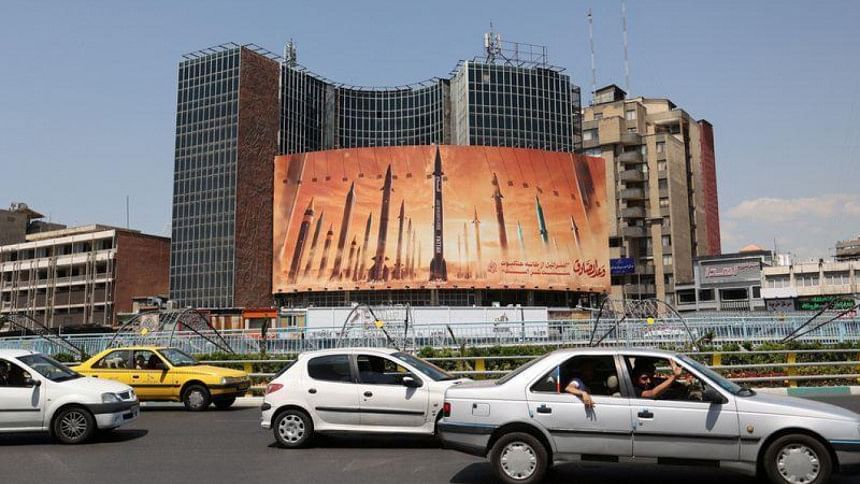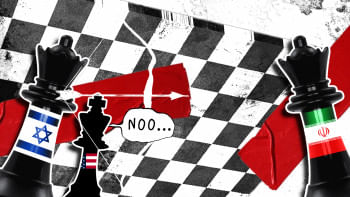Israel is rogue, but Iran must demonstrate restraint

Israel and Iran have finally come out of the closet with their unquenchable thirst for might and prevalence over the region. These two equally obstinate countries are no longer fighting a shadow war, and this raises significant concern for multiple stakeholders, including the Palestinians and the Sunni Arab states.
In Iran's defence, one could say that the country retaliated against Israel's attack on its consulate in Syria on April 1, which killed seven personnel of Iran's Islamic Revolutionary Guard Corps (IRGC), including two generals. It was Iran's way to send a strong message to Israel to stop its unprovoked attacks on Iranian sites in the region. On December 25 last year, an Israeli attack in Damascus resulted in the provocative assassination of high-ranking Iranian general Sayyed Razi Mousavi. Unfortunately, the US was lacking in condemning this reckless act by Israel. In view of the recurrence of Israel's unprovoked attacks, Iran was left with no other option but to showcase its military capabilities.
Unfortunately, there is nothing one could say in Israel's defence, except these callous acts are being orchestrated by a rogue government, headed by a potentially mentally incapacitated leader, without the support of the common people who regularly brave Israeli military violence to take to the streets demanding Netanyahu's resignation and an immediate end to the bloody conflict in the region.
It is to Iran's credit that the nation has downplayed the retaliatory attack by Israel on its key defence and nuclear site in Isfahan, comparing the quadcopters to "toys." Had Iran wanted, it could have chosen to respond again. It can be safely concluded that Israel was behind the April 19 quadcopter attack on Iran, given the former's tendency to frequently use these—their usage has been especially extensive in the ongoing war in Gaza.
While things are quiet on the Iranian front for now, one more Israeli misadventure could plunge the entire region into a full-fledged war. The limited-scale operations have already pushed it to the brink. This would not only unleash a bloodbath in the region, but would also significantly hurt the economic progress the region has made over the decades.
The Black Sea situation has already made global trade more expensive and uncertain, weakening the global supply chain, while raising the costs of doing business. As ships are being rerouted, it has also started hurting the countries in the region. Take the case of Egypt, for example. It is already struggling with high inflation and currency shortage; in fact, many of the countries in the region are. As shipping companies begin rerouting from the Suez Canal—one of the major income sources of Egypt—the country is feeling the pinch. The Arab countries would preferably want to avoid a scenario where decades of hard work resulting in their economic growth would be reversed.
At the same time, the Arab nations would not want to be in a position where they would have to "officially" side with Israel against a Muslim state, given its history of human rights abuses and war crimes against the Palestinians. The ongoing genocide in Gaza—now in its seventh month—has made it even more unpalatable for the Arab nations to openly side with Israel. However, there would always be the US attempts to mould them into compliance.
For the US, a full-blown conflict in the Middle East—as a result of Israeli recklessness—would make it difficult for it to continue its "iron-clad" support for its biggest ally. Already, the US military aid to Israel is being questioned, even at the domestic level, with increased pressure on the Biden administration to condition aid to Israel in the wake of its continued killing of civilians in Gaza.
For the Palestinians, a conflict between Israel and Iran essentially means a distraction from Israeli atrocities in Palestinian territories. At this point, while Palestine appreciates the moral support from Iran and its allies, including Yemen, Hezbollah and the other proxies, it does not want a shift of global focus from what is happening in Gaza and the Occupied West Bank to other conflicts in the region.
Neither does Iran seem to want a conflict with Israel, considering its muted response to the latest Israeli attack on Isfahan. One of the probable reasons is their readiness to counter more extensive attacks from Israel and its mighty ally, the US. Iran, as of yet, has not started making nuclear weapons, as recently noted by the International Atomic Energy Agency (IAEA), even though the country does have the materials. At the same time, in its last quarterly report, the IAEA disclosed that since the end of 2023, Iran has slowed the pace of its 60 percent uranium enrichment. The country is perhaps now eyeing creating a stronger acceptance in the region through re-establishment of relations with the Gulf Cooperation Council (GCC) countries. In the wake of Gaza genocide, Saudi Arabia has already softened its stance towards Iran. In fact, the China-brokered Saudi-Iran deal has been seen as a turning point in the reintegration of Iran in the greater region—albeit slowly.
So, despite so many quarters not wanting conflict escalation between Israel and Iran, why is the former doing everything it can to spread the fire?
For one, expanding the attacks beyond Gaza would enable Israeli Prime Minister Benjamin Netanyahu to stay in power to sustain his political career. The Gaza genocide has become highly unpopular among the people, and Netanyahu has lost support at home and abroad. In addition, given the multiple corruption charges facing Netanyahu and his massive unpopularity among the people, it is obvious that the moment the Gaza war ends and Netanyahu steps down, it will be his journey to prison and a timely demise of his political career.
Secondly, if one has monitored the developments in the US, one would notice how the pressure on the Biden administration to condition military aid to Israel has turned into calls for sending more aid in the pretext of helping boost its self-defence capabilities. Could Israel have perhaps intentionally goaded Iran to retaliate in order to help the Biden administration justify pumping more war arsenal into the Israeli ammunition inventory? Most likely.
There has been an interesting development in the US within a week of Iranian retaliation against Israel. The US House of Representatives approved $26 billion as emergency assistance to Israel, which includes around $14 billion in unconditional military aid. This will undoubtedly increase Israel's capability to launch more attacks on Gaza, southern Lebanon, Yemen, Syria, Iran, and any other country that it lays its eyes on. Giving Israel more military aid essentially means empowering a petulant, unruly and uncontrollable child with fatal toys to play with.
It remains to be seen what Israel does with its replenished weapons inventory.
But whatever Israel does, Iran should take the moral high ground by refraining from retaliation, thus creating more acceptance for its maturity in handling crisis situations and saving the region from a long-lasting bloody war.
Tasneem Tayeb is a columnist for The Daily Star. Her X handle is @tasneem_tayeb.
Views expressed in this article are the author's own.
Follow The Daily Star Opinion on Facebook for the latest opinions, commentaries and analyses by experts and professionals. To contribute your article or letter to The Daily Star Opinion, see our guidelines for submission.

 For all latest news, follow The Daily Star's Google News channel.
For all latest news, follow The Daily Star's Google News channel. 











Comments